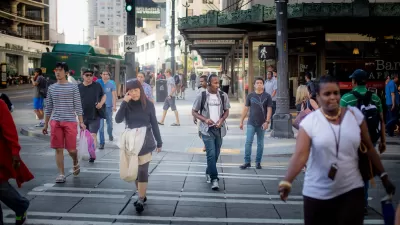If action isn’t taken to address the major issues the nation faces today, younger people will be contending with a lifetime of hardship. But older generations seem mostly to be looking the other way.

Henry Grabar writes about the generational conflict that is reflected in the complacent attitude of older Americans who did not have to contend with what young people are grappling with today—college debt, a lack of affordable housing, and the threat of climate change:
So when it comes to addressing the fact that reality has changed—that housing near good jobs is no longer affordable, that going to college now entails decades of debt, that Miami will be underwater in 30 years—their resistance to address the changing reality reads as a collective shrug of self-interest. I got mine.
Grabar notes that the current Congress has one of the oldest cohorts of legislators ever, and taking quick and bold action on these key issues has not been a priority. He adds that while these problems are weighing on younger people, affordable housing and climate change affect all generations and should be universal concerns.
And the growing gap between young and old is not just one of social and economic measures, but an ideological one as well. "In April, a Harvard Institute of Politics survey asked voters in their 20s to evaluate whether various groups ‘care about people like me.’ Boomers as a group scored lower than the Democratic Party, the Republican Party, and Donald Trump," writes Grabar.
Younger voters are showing up at the polls, and they need to keep doing that in the future, says Grabar. "But they can also try to make the case—in community meetings, in statehouses, and in Washington—for empathy. Young people in college, at planning meetings in Palo Alto, or protesting in Dianne Feinstein’s office, aren’t asking for anything radical—just for what their parents and grandparents already had."
FULL STORY: “I Got Mine”

Maui's Vacation Rental Debate Turns Ugly
Verbal attacks, misinformation campaigns and fistfights plague a high-stakes debate to convert thousands of vacation rentals into long-term housing.

Planetizen Federal Action Tracker
A weekly monitor of how Trump’s orders and actions are impacting planners and planning in America.

In Urban Planning, AI Prompting Could be the New Design Thinking
Creativity has long been key to great urban design. What if we see AI as our new creative partner?

How Trump's HUD Budget Proposal Would Harm Homelessness Response
Experts say the change to the HUD budget would make it more difficult to identify people who are homeless and connect them with services, and to prevent homelessness.

The Vast Potential of the Right-of-Way
One writer argues that the space between two building faces is the most important element of the built environment.

Florida Seniors Face Rising Homelessness Risk
High housing costs are pushing more seniors, many of them on a fixed income, into homelessness.
Urban Design for Planners 1: Software Tools
This six-course series explores essential urban design concepts using open source software and equips planners with the tools they need to participate fully in the urban design process.
Planning for Universal Design
Learn the tools for implementing Universal Design in planning regulations.
Gallatin County Department of Planning & Community Development
Heyer Gruel & Associates PA
JM Goldson LLC
City of Camden Redevelopment Agency
City of Astoria
Transportation Research & Education Center (TREC) at Portland State University
Jefferson Parish Government
Camden Redevelopment Agency
City of Claremont





























